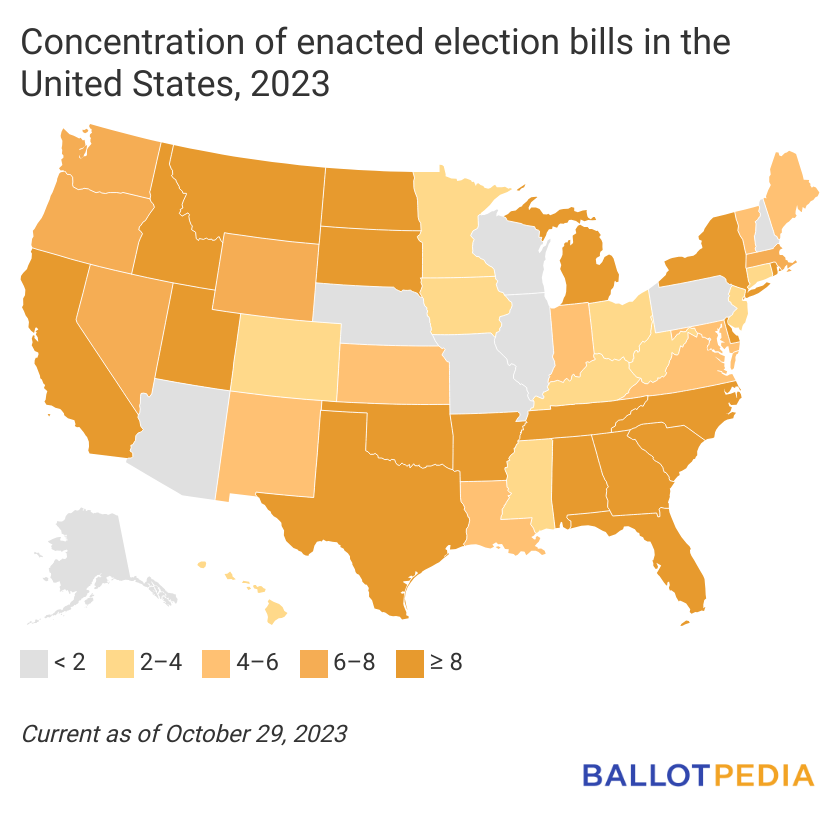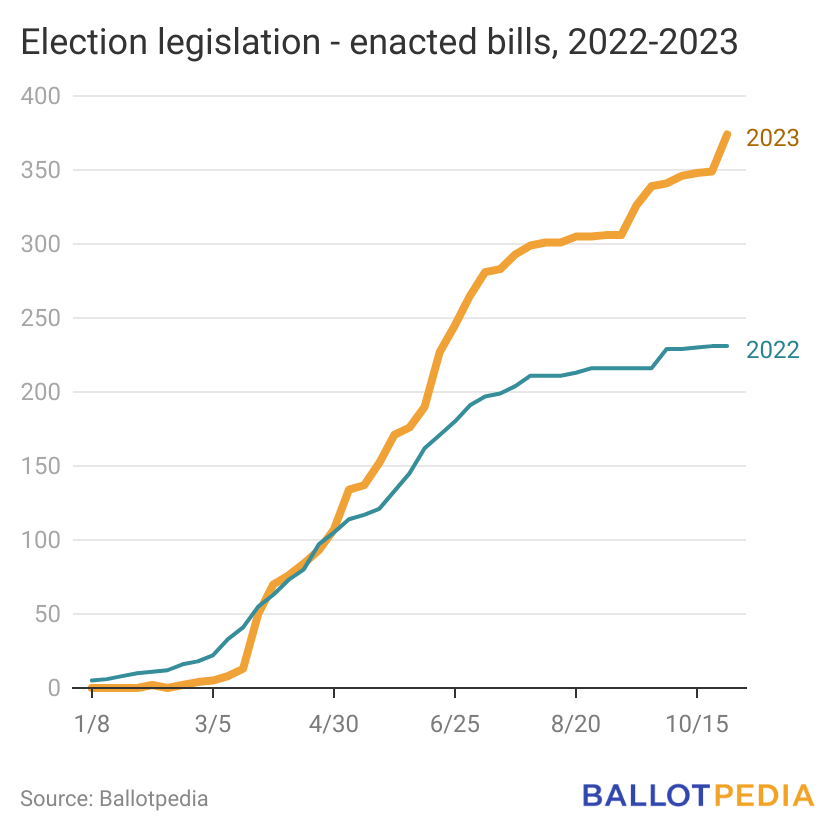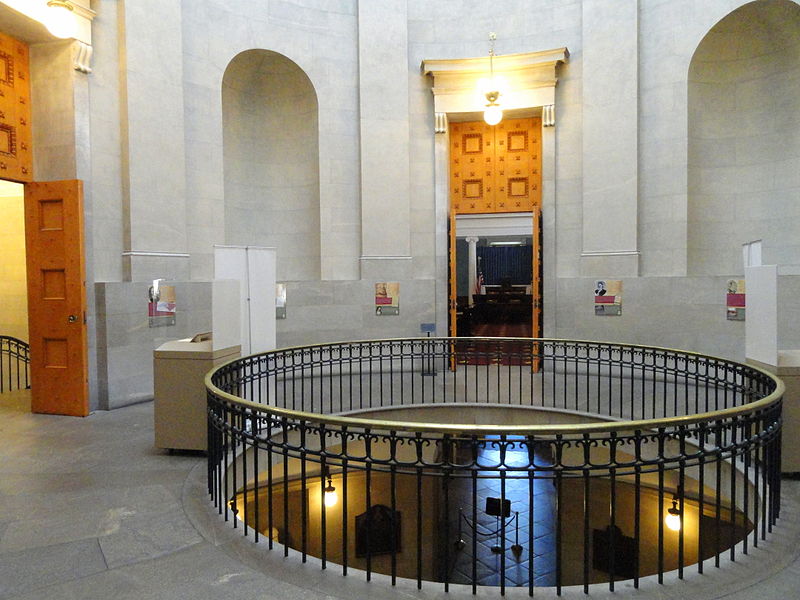As of Oct. 29, members of the General Assembly of North Carolina, which includes the North Carolina House of Representatives and the North Carolina State Senate, have passed 18 bills related to election administration since the beginning of the year. Of those 18 bills, legislators passed one during the week of Oct. 23-29. A bipartisan group of legislators sponsored the bill. The bill is:
- NC S68: Various Local Changes, Sens. Julie Mayfield (D) and Tim Moffitt (R).
- "As amended, this bill:
- Revises the method of municipal election in the City of Hendersonville, the Town of Fletcher, and the Village of Flat Rock. Elections require a plurality vote, eliminating primary elections and making the filing period the same as partisan county offices.
- Provides that regular municipal elections in the town of Hookerton will be held at the time of the state and federal general election in even-numbered years, that the elections will be nonpartisan, and that they will be conducted using the uniform municipal election laws.
- Increases the number of commissioners in the Town of Hookerton from two to four and requires that they be elected for staggered terms.
- Provides that the town of Walstonburg will elect a mayor and five commissioners to serve two-year terms at regular, nonpartisan municipal elections during the general elections in even-numbered years."
- "As amended, this bill:
Of the 18 bills passed this year, 18 have been enacted, with one being enacted during the week of Oct. 23-29. Republicans sponsored 14 bills, Democrats sponsored one, and a bipartisan group of legislators sponsored three. Five of the 18 bills are:
- NC S68: See the above bill.
- NC S747: Elections Law Changes, Sens. Kevin Corbin (R), Warren Daniel (R), Carl Ford (R), Ralph Hise (R), Matthew Johnson (R), Paul Newton (R), and Benton Sawrey (R).
- "This is an omnibus-style election policy bill that affects a number of different policy areas. As amended, this bill:
- Requires that ballots, election results tapes, and executed ballot applications are retained for at least 22 months after an election or longer if required by federal law.
- Prohibits the state board of elections, county boards of elections, and county boards of commissioners from accepting private donations or in-kind contributions for conducting elections or employing temporary workers. Makes an exception for donating space for use as a polling location, food or beverages for workers, and pens and personal protection equipment to be used in an election.
- Establishes that the chair of each political party in a county may appoint two registered voters of that county as election observers at each polling location where a candidate of the party appears on the ballot and up to 10 registered voters as observers at any polling location in the county. Also establishes that the chair of each political party in the state may designate up to 100 registered voters as poll observers in polling locations across the state where a party candidate appears on the ballot. Also allows an unaffiliated candidate to designate two observers at each voting place where that candidate appears on the ballot.
- Requires a list of election observers to be submitted 'electronically or in writing by noon on the business day before each observer is scheduled to serve,' and stipulates to whom these lists must be submitted.
- Prohibits more than three observers from the same political party from being in the same voting enclosure at one time."
- Click the hyperlinked bill number above for more information.
- "This is an omnibus-style election policy bill that affects a number of different policy areas. As amended, this bill:
- NC S749: No Partisan Advantage in Elections, Sens. Lisa Barnes (R), Kevin Corbin (R), Warren Daniel (R), Ralph Hise (R), and Paul Newton (R).
- "As amended, this bill:
- Arranges for the State Board of Elections to be administratively placed under the Department of the Secretary of State (while still being independent in action).
- Modifies the makeup of the State Board of Elections from five members appointed by the Governor to eight members appointed by the General Assembly following specified guidelines.
- Provides the State Board of Elections members will serve four-year terms, beginning May 1 after the election of members of the Council of State.
- Directs that vacancies on the State Board of Elections will be filled by the General Assembly.
- Modifies the number of members required to request to move a meeting to a different location from four to five."
- Click the hyperlinked bill number above for more information.
- "As amended, this bill:
- NC H229: Stagger/Extend Terms of Town Officers/Halifax, Rep. Michael Wray (D).
- "As introduced, this bill:
- Amends the charter for the town of Halifax to establish four-year staggered terms for the mayor and commissioners.
- Aligns municipal elections with the general election in odd-numbered years.
- Adds electing these positions on a nonpartisan plural basis in accordance with uniform municipal election procedures.
- Provides for the upcoming election schedule."
- "As introduced, this bill:
- NC H57: Harmony/Love Valley Election Changes, Reps. Lindsey Prather (D), Jennifer Capps Balkcom (R), and William Ward (R).
- "As amended, this bill:
- Establishes that regular municipal elections in the Town of Harmony will be held at the time of the general election in even-numbered years.
- Establishes that municipal elections in the Town of Love Valley will be held at the time of the general election in even-numbered years.
- Provides that these mayoral and town council elections will be nonpartisan and plurality based, and that elected officials will serve four-year terms with council members’ terms being staggered."
- "As amended, this bill:
From Oct. 23-29, legislators passed three bills related to election administration nationally. As of Oct. 29, Texas legislators have passed the most bills this year with 35, while Alaska, Missouri, New Hampshire, and Pennsylvania legislators have passed the fewest bills with zero. The state with the most enacted bills is Texas with 34, while four states have enacted none.


The General Assembly of North Carolina was scheduled to be in regular session from Jan. 11 to Aug. 31 this year. In 2022, North Carolina legislators passed one election-related bill in the state House. The bill was not enacted into law. North Carolina is a divided government, meaning neither party holds trifecta control.
Additional reading:



